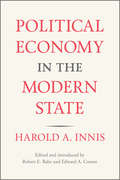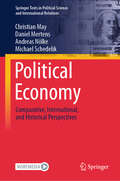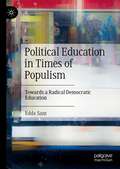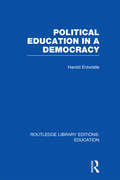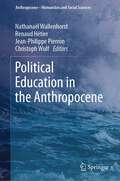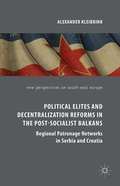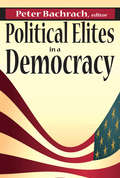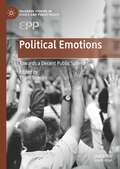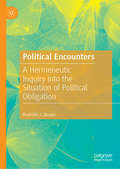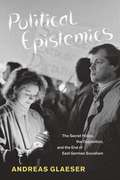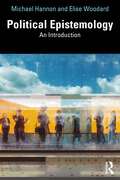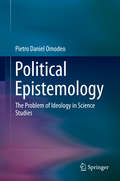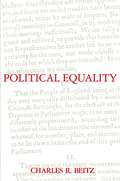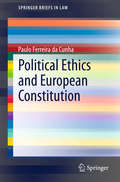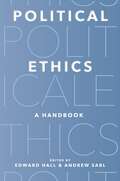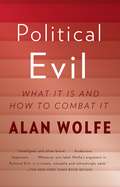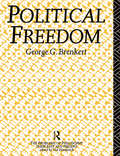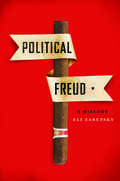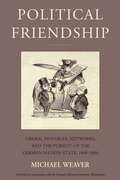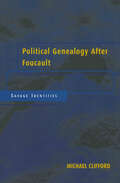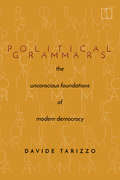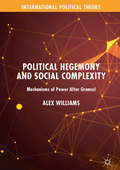- Table View
- List View
Political Economy in the Modern State
by Harold Innis Robert Babe Edward ComorPolitical Economy in the Modern State is Harold Innis’s transitional and, in some respects, his most transformative book. Completed in 1946, it is a collection of fifteen chapters plus a remarkable Preface selected and crafted to address four main themes: the problem of power and peace in the post-War era; the ascent of specialized and mechanized forms of knowledge involving, most particularly, the media, the state, and the academy; the crisis facing civilization and, more generally, the modern penchant for unreflexive short-term thinking in the face of mounting contradictions; and Innis’s growing focus on what would be called media bias.In this new edition, editors Robert E. Babe and Edward A. Comor provide not only a general introduction to Innis’s largely forgotten book but also dedicated introductions to each of its fifteen chapters and a comprehensive index. Together, Babe and Comor demonstrate how Innis’s volume reflects a shift in Innis’s focus, away from analytical relativism towards, instead, a reflexive search for objective truths.
Political Economy of Institutions and Decisions: Above Politics
by Gary J. Miller Andrew B. WhitfordEconomic development requires secure contract enforcement and stable property rights. Normal majority-rule politics, such as bargaining over distributive and monetary policies, generate instability and frequently undermine economic development. Above Politics argues that bureaucracies can contribute to stability and economic development, but only if they are insulated from unstable politics. A separation-of-powers stalemate creates the conditions for bureaucratic autonomy. But what keeps delegated bureaucrats from being more abusive as they become more autonomous? One answer is the negotiation of long-term, cooperative relationships - that (when successful) typically bind subordinates to provide more effort in exchange for autonomy. Even more compelling is professionalism, which embeds its professional practitioners in professional norms and culture, and incidentally mitigates corruption. Financial examples are provided throughout the book, which ends with an analysis of the role played by professionalized bureaucracies during the Great Recession.
Political Economy of Institutions and Decisions: Marketing Sovereign Promises
by Cox Gary W.How did England, once a minor regional power, become a global hegemon between 1689 and 1815? Why, over the same period, did she become the world's first industrial nation? Gary W. Cox addresses these questions in Marketing Sovereign Promises. The book examines two central issues: the origins of the great taxing power of the modern state and how that power is made compatible with economic growth. Part I considers England's rise after the revolution of 1689, highlighting the establishment of annual budgets with shutdown reversions. This core reform effected a great increase in per capita tax extraction. Part II investigates the regional and global spread of British budgeting ideas. Cox argues that states grew only if they addressed a central credibility problem afflicting the Ancien R#65533;gime - that rulers were legally entitled to spend public revenue however they deemed fit.
Political Economy: Comparative, International, and Historical Perspectives (Springer Texts in Political Science and International Relations)
by Andreas Nölke Christian May Daniel Mertens Michael SchedelikThis textbook offers a comprehensive introduction to Political Economy. It combines comparative,international and historical perspectives into a holistic framework of analysis. Drawing on the workof Karl Polanyi, the book shows how capitalist economies differ around the globe and how they areembedded in the international economic order. Through a critical-institutionalist lens, it helps toaccount for the evolution of contemporary capitalism and addresses current topics at the intersection of political science and economics.Students and instructors can draw on supplementary material, such as Power Point slides withall figures and tables as well as the Springer Nature Flashcards app with exercises.
Political Education in Times of Populism: Towards a Radical Democratic Education
by Edda Sant"In professional and academic contexts nothing is more important than helping people to understand and engage with democratic society. Sant has written an excellent book which helps greatly towards that end. She has developed incisive new arguments about the nature of contemporary politics and education. Using the most recent as well as classic literature, she explores key ideas and issues. Through wide ranging discussions and by referring to her own valuable empirical work she characterizes and creates thoughtful insights and innovative pedagogical approaches. This book achieves the very difficult task of illuminating complex ideas at the same time as helping to determine practical ways to achieve social justice through education. Political education has been neglected for too long. This book is a bold new step in its achievement."—Ian Davies, Emeritus Professor, University of York, UKThis book examines political education in times of democratic crisis, polarisation and uncertainty. Using populism as a diagnostic tool, the book scrutinises current democratic practices and considers alternatives for future social studies and citizenship education. The author examines contemporary events including Brexit, the Catalan referendum for independence and protests in Chile to ask how democratic educators can respond to times of crisis. Centered on themes of knowledge and ideology, the book draws together political philosophy and educational research to map out, critically analyse and offer alternatives to dominant debates on political education. It will be of interest and value to scholars examining the relationship between democracy and educational theory and practice.Edda Sant is Senior Lecturer at Manchester Metropolitan University, UK. A former social studies teacher, her research interests lie in citizenship, political and democratic education. She has published widely in this field, and in 2016 was recognized with a Children’s Identity & Citizenship European Association Award.
Political Education in a Democracy (Routledge Library Editions: Education)
by Harold EntwistleIn this volume the author analyzes the relationships of concepts such as socialization and political education, explains those aspects of the theory and practice of democracy that are especially relevant for schools, and suggests ways in which teachers can better provide for the political education of their students.
Political Education in the Anthropocene (Anthropocene – Humanities and Social Sciences)
by Christoph Wulf Nathanaël Wallenhorst Renaud Hétier Jean-Philippe PierronThis book articulates an educational theory as well as a political theory of the Anthropocene. Divided into three sections it addresses educational anthropology, cultures and institutions, and educational recommendations in the Anthropocene. Topics covered in the volume measure the impact of the idea of the Anthropocene on the type of anthropology that underlies education and on a phenomenology of relationship. It links the notion of the Anthropocene with cultures and institutions so as not to 'smooth out' or erase the latter. Finally, it presents proposals and recommendations for educational practices. The work advocates rethinking education as an essential component in ensuring the sustainability of human life in society - by proposing to go beyond the approach of education for sustainable development or environmental education. The work also brings together empirical contributions in which proposals are elaborated for programs, pedagogical devices and experiments relating to the preparation of the future in the field of education. This volume is of interest to researchers of the Anthropocene.
Political Elites and Decentralization Reforms in the Post-Socialist Balkans: Regional Patronage Networks in Serbia and Croatia (New Perspectives on South-East Europe)
by Alexander KleibrinkAcross the globe, more powers are being devolved to local and regional levels of government. This book provides an innovative analysis of such decentralisation in transition states in the Balkans. Using new and rich data, it shows how political elites use decentralisation strategically to ensure their access to state resources.
Political Elites in a Democracy (Controversy Ser.)
by Peter BachrachOne of the potentially explosive issues of the modern era is a vast and growing disparity between the overwhelming predominance of elites in the decision-making process and the democratic ideal that people should participate in making decisions that vitally affect them. In this book an impressive array of political theorists offer conflicting views on the form of democratic elitism practiced in the United States.Defining the political elite as "the power holders of the body politic," Harold Lasswell explains that the division into elite and mass is universal, while Robert Dahl confirms that key political, economic, and social decisions are indeed made by these tiny minorities. Paul Good man argues that we are now in a period of excessive centralization that he regards as "economically inefficient, technologically unnecessary, and humanly damaging." From another standpoint, Herbert Marcuse calls for a struggle against the ideology of tolerance husbanded by the political elites in this country and Jack L. Walker contends that elitist theory has provided an unconvincing explanation of the widespread political apathy in American society.As the events of recent decades vividly demonstrate, a growing number of people refuse to recognize elite rule. This many-sided work puts before the student a variety of strongly held opinions regarding the place and function of the political elite and its power. The wide range of authoritative articles makes Political Elites in a Democracy a most useful addition to every course in political science that touches on the subject of elites and political power.
Political Emotions
by Martha C. NussbaumHow can we achieve and sustain a "decent" liberal society, one that aspires to justice and equal opportunity for all and inspires individuals to sacrifice for the common good? In this book, a continuation of her explorations of emotions and the nature of social justice, Martha Nussbaum makes the case for love. Amid the fears, resentments, and competitive concerns that are endemic even to good societies, public emotions rooted in love--in intense attachments to things outside our control--can foster commitment to shared goals and keep at bay the forces of disgust and envy. Great democratic leaders, including Abraham Lincoln, Mohandas Gandhi, and Martin Luther King Jr. , have understood the importance of cultivating emotions. But people attached to liberalism sometimes assume that a theory of public sentiments would run afoul of commitments to freedom and autonomy. Calling into question this perspective, Nussbaum investigates historical proposals for a public "civil religion" or "religion of humanity" by Jean-Jacques Rousseau, Auguste Comte, John Stuart Mill, and Rabindranath Tagore. She offers an account of how a decent society can use resources inherent in human psychology, while limiting the damage done by the darker side of our personalities. And finally she explores the cultivation of emotions that support justice in examples drawn from literature, song, political rhetoric, festivals, memorials, and even the design of public parks. "Love is what gives respect for humanity its life," Nussbaum writes, "making it more than a shell. " Political Emotions is a challenging and ambitious contribution to political philosophy.
Political Emotions: Towards a Decent Public Sphere (Palgrave Studies in Ethics and Public Policy)
by Thom BrooksHow might political emotions contribute to the creation of a decent public sphere? Our societies are characterized by difference and contestation. Cultivating political emotions can appear counterproductive to stability and peace. But there is an increasing recognition that emotions can be harnessed to empower community cohesion and social justice – and new ideas about how our political emotions can foster a decent public sphere and overcome intolerance are urgently needed. In Political Emotions: Towards a Decent Public Sphere, leading theorists consider the limits and prospects of cultivating our emotions that support social justice. All examine this topic from a diversity of disciplinary perspectives breaking new ground and yielding new understandings. Issues explored include adaptive preferences, capabilities, civil religion, compassion, conscience, dignity, feminism, imagination, multicultural citizenship, perfectionism, political liberalism, public sentiments, sympathy and much more in a wide-ranging exploration of key themes in contemporary political philosophy – and Martha C. Nussbaum’s significant contributions to it in particular - that should be of interest to anyone working in these broad areas.
Political Encounters: A Hermeneutic Inquiry into the Situation of Political Obligation
by Ruairidh J. BrownThis book takes the novel approach of framing Political Obligation as a situation rather than a problem. By doing so, Political Obligation is not considered as an issue to be solved, but a central condition of existence to be investigated and understood. The book launches a hermeneutic inquiry into how this relationship of obligation is constructed through encounters in which the citizen comes face-to-face with the existential manifestations of the State. The book first discusses the dominant approaches to Political Obligation to elucidate the benefits of an existential hermeneutical approach. The notion of encounter is then developed into a hermeneutic approach capable of uncovering and interpreting the arguments, ideas, and narratives of obligation as are communicated in political communities. Finally, the limitations of this approach are considered in reference to the concerns of the Post-truth era.
Political Epistemics: The Secret Police, the Opposition, and the End of East German Socialism (Chicago Studies in Practices of Meaning)
by Andreas GlaeserWhat does the durability of political institutions have to do with how actors form knowledge about them? Andreas Glaeser investigates this question in the context of a fascinating historical case: socialist East Germany’s unexpected self-dissolution in 1989. His analysis builds on extensive in-depth interviews with former secret police officers and the dissidents they tried to control as well as research into the documents both groups produced. In particular, Glaeser analyzes how these two opposing factions’ understanding of the socialist project came to change in response to countless everyday experiences. These investigations culminate in answers to two questions: why did the officers not defend socialism by force? And how was the formation of dissident understandings possible in a state that monopolized mass communication and group formation? He also explores why the Stasi, although always well informed about dissident activities, never developed a realistic understanding of the phenomenon of dissidence. Out of this ambitious study, Glaeser extracts two distinct lines of thought. On the one hand he offers an epistemic account of socialism’s failure that differs markedly from existing explanations. On the other hand he develops a theory—a sociology of understanding—that shows us how knowledge can appear validated while it is at the same time completely misleading.
Political Epistemology: An Introduction
by Michael Hannon Elise WoodardThe New Scientist recently declared that “Philosophers of knowledge, your time has come” and even Barack Obama has warned of an “epistemological crisis.” Following the election of Donald Trump for the second time, the rise of populism, and the proliferation of misinformation and conspiracy theories, epistemological questions are now forefront in our political lives. Can epistemology explain the challenges of "post-truth"? Does voter ignorance threaten democracy? Is political disagreement epistemically valuable or harmful?This extremely timely introduction to political epistemology tackles these questions and many more. In a clear and engaging style, Michael Hannon and Elise Woodard examine the following key topics: the relation between truth and politics, including the arguments of Plato, Mill and Rawls; the epistemology of democracy, including questions about how democracies must be fair and representative and also make good decisions; how political ignorance may undermine democracy; irrationality and partisan bias; political belief and group loyalty; political disagreement and polarization; and the potential conflict between democracy and expert authority.With the inclusion of chapter summaries and further reading, Political Epistemology: An Introduction is the ideal starting place for anyone studying this fascinating and rapidly growing topic, whether in epistemology, political philosophy, or applied ethics. It will also be of interest to students and researchers in related fields, such as political science, law, and public policy.
Political Epistemology: The Problem of Ideology in Science Studies
by Pietro Daniel OmodeoThis book is an investigation of the ideological dimensions of the disciplinary discourses on science in line with the scholarly tradition of historical epistemology. It offers a programmatic treatment of the political-epistemological problematic along three entangled lines of inquiry: socio-historical, epistemological and historiographical. The book aims for a meta-level integration of the existing scholarship on the social and cultural history of science in order to consider the ways in which struggles for hegemony have constantly informed scientific discourses. This problematic is of primary relevance for scholars in Science Studies, philosophers, historians and sociologists of science, but would also be relevant for anybody interested in scientific culture and political theory.
Political Equality: An Essay in Democratic Theory
by Charles R. BeitzThe description for this book, Political Equality: An Essay in Democratic Theory, will be forthcoming.
Political Ethics and European Constitution
by Paulo Ferreira da CunhaIs the dream of EU endangered? This book reviews classic and modern values and virtues, and uses them in order to rethink Europe's present politics and its future. The idea of the Republic was born with the political ethics of ancient Greece. The current international crisis obliges Europe to face the mirror of truth: What has become of the European Idea and how fares the European Constitution? It has been a long road from the Greek Politeia to the present lack of values and financial monomania in Europe, who seems to have lost any harmony between the spirit, the soul and the body of her Constitution: the will and values of the people (material constitution), the text of the Lisbon Treaty (formal constitution) and its current political interpretation and action (real constitution), making Europe a two-tier or three-tier club, far from the dream of the founding fathers. Without republican values and virtues, and failing to uphold the European social model, the European Union would devolve into moral, social and democratic bankruptcy.
Political Ethics: A Handbook
by Edward Hall and Andrew SablA comprehensive introduction to contemporary political ethicsWhat is the relationship between politics and morality? May politicians bend moral constraints in the name of political necessity? Is it always wrong for leaders to lie? How much political compromise is too much (or too little)? In Political Ethics, some of the world’s leading thinkers in politics, philosophy, and related fields offer a comprehensive and accessible introduction to key issues in this rapidly growing area of political theory.In a series of original essays, the contributors examine a range of urgent political problems: lies and deception, compromise and refusal to compromise, the meaning and limits of political integrity, representation and failures of representation, good and bad democratic leadership, the virtues and excesses of partisanship, administrative ethics, political corruption, whistleblowing, legitimate and illegitimate claims of political emergency, and lobbying. What emerges are realistic but demanding ethical standards—and a clear-eyed understanding of the ethical challenges of political life in the twenty-first century.With contributions by Richard Bellamy, Alin Fumurescu, Edward Hall, Suzanne Dovi and Jesse McCain, Eric Beerbohm, Russell Muirhead and Nancy Rosenblum, Joseph Heath, Elizabeth David-Barrett and Mark Philp, Michele Bocchiola and Emanuela Ceva, Nomi Lazar, Phil Parvin, and Andrew Sabl.
Political Evil: What It Is and How to Combat It
by Alan WolfeA timely, eye-opening examination of political evil, a concept widely misunderstood and desperately in need of clarification in our ever more chaotic world.In an age of genocide, terrorism, ethnic cleansing, and torture, evil threatens us in ways radically different from tsunamis and financial panics. Nature unleashes its wrath and people rush to help the victims. Evil shows its face and we are paralyzed over how to respond.It was not always this way. During the twentieth century, thinkers as diverse as Hannah Arendt, Reinhold Niebuhr, Arthur Koestler, and George Orwell made evil central to everything they wrote. Acclaimed political scientist Alan Wolfe argues that in an age of partisan blame-assigning, therapeutic excuse-making, and theological question-dodging, we need to get serious about the problem of evil once again. While there will always be something incomprehensible about evil, we are very much capable of understanding and combating the use of evil means to obtain political ends. Diplomats and politicians with their own agendas ignore this side of evil to grim and often tragic effect. These movers and shakers apply the concept of general evil, seemingly inconquerable, inviting only violence and despair to situations that are local in nature. Looking at examples of political evil around the globe--in the Middle East, Darfur, the Balkans, and at home in the West--Wolfe shows us how seemingly small distinctions can make an immense difference in international response. And he makes clear that much-needed change can be initiated with a shift in how we talk and think about political evil.International shame in the years following the Rwandan genocide--after the world failed to recognize it as such--led to a large-scale campaign against genocide in Darfur. Except, Wolfe argues, in Darfur it wasn't genocide: it was civil war. We see--surprisingly, and powerfully--that labeling the conflict incorrectly had disastrous effects, even extending the violence as soldiers waited for seemingly inevitable Western intervention. When, on the other hand, Western leaders compared Serbian president and infamous ethnic cleanser Slobodan Milosevic to Hitler, they failed to recognize that exterminating people and seeking to take over their land are both evil but they are evil in different ways; misguided Western intervention in the Balkans eventually brought ethnic cleansing to an end, but only by allowing it to run its course.At once impassioned and pragmatic, Political Evil sheds essential light on the creation of policy and on a concrete path to a more practicable and just future.From the Hardcover edition.
Political Freedom (Problems of Philosophy #49)
by George G. BrenkertThis book examines the underlying theoretical issues concerning the nature of political freedom. Arguing that most previous discussions of such freedom have been too narrowly focused, it explores both conservativism from Edmund Burke to its present resurgence, the radical tradition of Karl Marx, as well as the orthodox liberal model of freedom of John Locke, John Stuart Mill and Isaiah Berlin. Political Freedom argues that these three accounts of political freedom - conservative, liberal and radical - all have internal weaknesses which render them unsatisfactory.In the second part of the book George Brenkert develops an alternative theory of political freedom. Using the guiding concept of empowerment, his model explores individual rights, democratic participation in government and workplace, and the need to provide the material and educational resources to allow individuals to effectively exercise their rights to self-determination. It is a clear and bold attack on the view that there is no link between freedom and power.
Political Freud: A History
by Eli ZaretskyIn this masterful history, Eli Zaretsky reveals the power of Freudian thought to illuminate the great political conflicts of the twentieth century. Developing an original concept of "political Freudianism," he shows how twentieth-century radicals, activists, and intellectuals used psychoanalytic ideas to probe consumer capitalism, racial violence, anti-Semitism, and patriarchy. He also underscores the continuing influence and critical potential of those ideas in the transformed landscape of the present. Zaretsky's conception of political Freudianism unites the two overarching themes of the last century—totalitarianism and consumerism—in a single framework. He finds that theories of mass psychology and the unconscious were central to the study of fascism and the Holocaust; to African American radical thought, particularly the struggle to overcome the legacy of slavery; to the rebellions of the 1960s; and to the feminism and gay liberation movements of the 1970s. Nor did the influence of political Freud end when the era of Freud bashing began. Rather, Zaretsky proves that political Freudianism is alive today in cultural studies, the study of memory, theories of trauma, postcolonial thought, film, media and computer studies, evolutionary theory and even economics.
Political Friendship: Liberal Notables, Networks, and the Pursuit of the German Nation State, 1848-1866 (Studies in German History #29)
by Michael WeaverBetween periods of revolution, state repression, and war across Central and Western Europe from the 1840s through the 1860s, German liberals practiced politics beyond the more well-defined realms of voluntary associations, state legislatures, and burgeoning political parties. Political Friendship approaches 19th century German history’s trajectory to unification through the lens of academics, journalists, and artists who formed close personal relationships with one another and with powerful state leaders. Michael Weaver argues that German liberals thought with their friends by demonstrating the previously neglected aspects of political friendship were central to German political culture.
Political Genealogy After Foucault: Savage Identities
by Michael CliffordCombining the most powerful elements of Foucault's theories, Clifford produces a methodology for cultural and political critique called "political genealogy" to explore the genesis of modern political identity. At the core of American identity, Clifford argues, is the ideal of the "Savage Noble," a hybrid that married the Native American "savage" with the "civilized" European male. This complex icon animates modern politics, and has shaped our understandings of rights, freedom, and power.
Political Grammars: The Unconscious Foundations of Modern Democracy (Square One: First-Order Questions in the Humanities)
by Davide TarizzoDo we need to be a "people," populus, in order to embrace democracy and live together in peace? If so, what is a populus? Is it by definition a nation? What exactly do we mean by nationality? In this book, Davide Tarizzo takes up the problem of modern democratic, liberal peoples—how to define them, how to explain their invariance over time, and how to differentiate one people from another. Specifically, Tarizzo proposes that Jacques Lacan's theory of the subject enables us to clearly distinguish between the notion of personal identity and the notion of subjectivity, and that this very distinction is critical to understanding the nature of nations whose sense of nationhood does not rest on any self-evident identity or pre-existent cultural or ethnic homogeneity between individuals. Developing an argument about the birth and rise of modern peoples that draws on the American Declaration of Independence of 1776 and the French Declaration of the Rights of Man and the Citizen of 1789 as examples, Tarizzo introduces the concept of "political grammar"—a phrase that denotes the conditions of political subjectification that enable the enunciation of an emergent "we." Democracy, Tarizzo argues, flourishes when the opening between subjectivity and identity is maintained. And in fact, as he compellingly demonstrates, depending on the political grammar at work, democracy can be productively perceived as a process of never-ending recovery from a lack of clear national identity.
Political Hegemony and Social Complexity: Mechanisms of Power After Gramsci (International Political Theory)
by Alex WilliamsHow can we understand power in a world of ever-growing complexity? This book proposes that we can do so by rethinking the theory and practice of political hegemony through the resources of complexity theory. Taking Gramsci’s understanding of hegemony as its starting point, the book argues that the intricacies of contemporary power can be mapped by applying concepts drawn from complexity theory, such as emergence, self-organisation, metastability, and generative entrenchment. It develops an original account of social complexity, drawing upon critical realist sociology, analytic philosophy of science, Marxist and continental philosophies, and neoliberal and anarchist thought. It then draws out the elements of Gramscian hegemony that already align with complexity concepts, such as the balance of forces, common sense, and the historic bloc. On this basis, the book sets out the different dimensions of complex hegemonic power before using this theory to interpret the nature of the power of neoliberalism since 2008.
